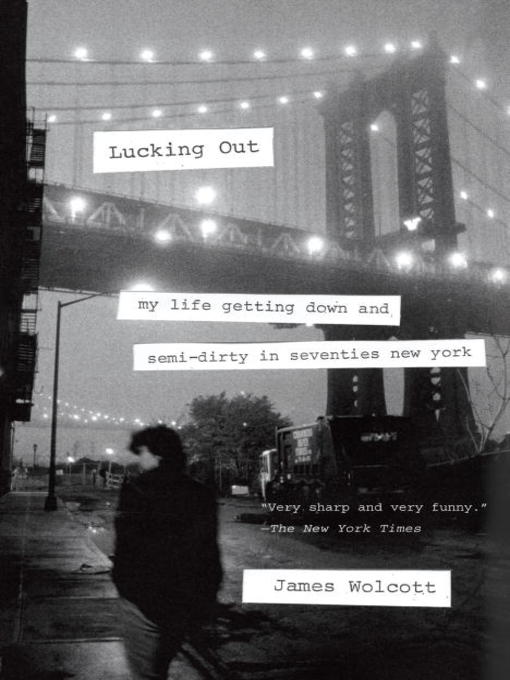
Lucking Out
My Life Getting Down and Semi-Dirty in the Seventies
کتاب های مرتبط
- اطلاعات
- نقد و بررسی
- دیدگاه کاربران
نقد و بررسی

August 8, 2011
Grunge, glitz, and gossip decorate this lively, catty memoir of Manhattan’s Me Decade creative ferment. Vanity Fair critic Wolcott (Attack Poodles and Other Media Mutants) arrived as a college dropout in 1972 and scored a writing gig at the Village Voice—a snake-pit of feuds and nude editing—that inducted him into the city’s hippest scenes. Chief among these was the punk-rock incubator at the bar CBGB, which affords him vibrant portraits of Patti Smith, the Talking Heads, and other punk luminaries against a backdrop of Hells Angels. Wolcott cameos celebrities from Bob Dylan and Gore Vidal—he doesn’t so much drop names as spike them like a running back in the end zone—to the glamorous, squalid city itself, with its crime and crazies and open-air gay trysting. Wolcott’s hip, closeup yet detached narrative falters during worshipful scenes of his mentor Pauline Kael, the New Yorker movie reviewer who elevated criticism to “a higher power”; his reminiscences of dishing and cackling with Kael at screenings and soirées feel claustrophobic and dull. While his commentary on the cultural commentary sags, Wolcott’s take on New York’s culture itself, from schlubby porn impresarios to diaphanous ballerinas, is entertaining and evocative.

Starred review from September 1, 2011
Longtime Vanity Fair cultural critic Wolcott (Attack Poodles and Other Media Mutants, 2004, etc.) celebrates the Big Apple as a haven for the writers, artists, musicians and eccentrics who thrived at its core in the 1970s.
Of the many sentences in Wolcott's memoir that will have contemporary Manhattan-philes gnashing their teeth in envy is this one recounting how the author dealt with losing his on-site staff job at the Village Voice: "From that point onward I never worked a regular office job again, solely writing for a living, something that would have been impossible if New York hadn't been a city of low rents and crappy expectations that didn't require a trust fund or a six-figure income for the privilege of watching everything fall apart before your eyes." Actually, the entire book is not only a bittersweet valentine to a much-maligned era but a model of exemplary prose that any writer would do well to study. Wolcott's talent for choosing words, shaping sentences, constructing paragraphs and crafting each of the five sections into an essay that stands on its own reveals an architectonic approach lacking in many current memoirs. The author also understands how to apply his individual experiences to the larger context of the zeitgeist. For example, the section entitled "Bodily Contact" weaves personal encounters into a critique of "Me Decade" sexual mores, drawing on Bob Fosse films, the seedy atmosphere of pre–tourist friendly Times Square, the emerging gay-rights movement and concerns about the dark side of the pick-up culture prevalent at both straight and gay bars. Wolcott also rubbed shoulders with the luminaries of the day, including his mentor, the rabble-rousing author Norman Mailer, punk songstress Patti Smith and legendary movie critic Pauline Kael. His poignant reminiscences of Kael pave the way for the book's plaintive conclusion.
Gives the lie to the belief that the '70s contained nothing but disco decadence and self-help solipsism.
(COPYRIGHT (2011) KIRKUS REVIEWS/NIELSEN BUSINESS MEDIA, INC. ALL RIGHTS RESERVED.)

October 1, 2011
No fan of memoirs, Vanity Fair cultural critic Wolcott has nonetheless written one about his wonder years in New York City in the 1970s. Given his role as tastemaker in writing about music, movies, television, and books, Wolcott presents both a self-portrait as a novice arts journalist and a portrait gallery of the scene makers during the heyday of consequences-be-damned criticism. With some offhand encouragement from Norman Mailer, Wolcott quixotically quit college, moved to New York, and badgered his way into a job at the then enormously influential Village Voice. His hilarious account of his trial by fire at this veritable gladiator school for journalism is acidly revealing of the dynamics at work in crisis-riddled New York, a crucible for gutsy creativity. Wolcott incisively celebrates such key figures as Patti Smith and David Byrne, caustically annihilates prominent writers, and praises to the skies his guiding light, film critic extraordinaire Pauline Kael. A work of mettlesome personal remembrance and piercing cultural history, Wolcott's electrifying tale of the forging of a writer can also serve as a course on writing laser-precise and propulsive prose.(Reprinted with permission of Booklist, copyright 2011, American Library Association.)

























دیدگاه کاربران